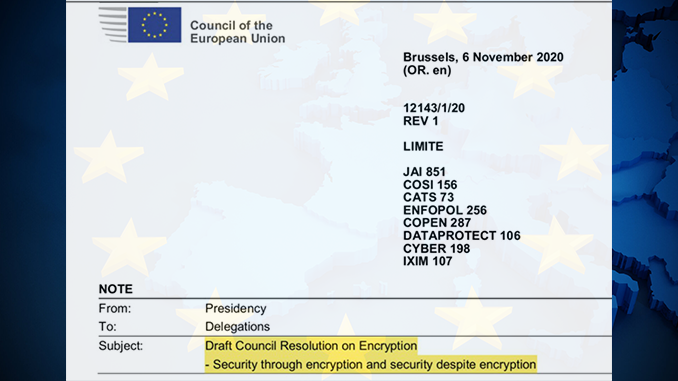
In the EU, regulation of cryptographically encrypted communication via services such as WhatsApp is on the way. The background is terrorist attacks such as the recent one in Vienna. Can these developments also have an impact on the crypto industry?
Cryptography explains the lexicon as a “secret code” and a branch of mathematics that allows the securely encrypted exchange of information. In connection with Bitcoin and Co., cryptography is a crucial cornerstone of the concept of tamper-proof financial transactions. In online communication, cryptography ensures that chats remain private and cannot be read by third parties. This purpose has long been a thorn in the side of intelligence services and the police, because cryptography also protects the chats of terrorists and criminals. With the terrorist attack in Vienna last week, WhatsApp and other messenger services are once again coming under fire. Under the German EU Council Presidency, a bill is now to be presented to the EU Parliament, which obliges WhatsApp and others to make cryptographic encryption decryptable in suspicious cases.
But the proposal is delicate. Experts point out that master keys and/or secret backdoors in messenger services may sooner or later fall into hands other than those of the authorities, thus compromising the entire system. The argumentation leads in the direction that legal restrictions on the use of cryptography threaten privacy and would mean a general taboo break. In the public bill that has become law, the talk of “security through decryption and security despite decryption” is vague.
Crypto industry unthinkable without cryptography
What is noticeable: In the political discussion about better security for civil society and cryptography, everything revolves around WhatsApp, Telegram, Signal and comparable messenger services. But the other important commercial branch of cryptography, namely crypto-currencies, is ignored. Legally required backdoors or masterkeys in this area would immediately destroy trust in Bitcoin and Co. In Germany industry federations such as Bitkom or the Blockhain Federal association are silent so far to the bill.
The situation resembles in some respects the early years of Bitcoin. Because BTC initially gained importance and publicity by being the preferred currency for illegal business, Bitcoin sometimes continues to have the reputation of being the tool of criminals. Transferred to WhatsApp and Co.: Because terrorists have also discovered cryptography for themselves, a general suspicion is laid over these applications.
Conclusion: The thorny dilemma of cryptography
The balancing act between legitimate security interests and equally legitimate privacy is hardly resolvable. If the EU actually decides to legally intervene in the field of cryptography, there is a great danger of overshooting the mark. Whether it is updates for operating systems, confidential communication in politics and justice, democracy movements in Hong Kong or Belarus – cryptography has become part of everyday life in many areas of life. If you soften the encryption at one point, you will put the entire system in trouble. It is to be hoped that parliamentarians will not be tempted to set an example against cryptography even under the impression of abhorrent terrorist acts. Because one thing is taught again and again by the occupation with politics and cryptography: There is a lack of professional competence among members of parliament and ministers to estimate the range and explosiveness of well-meant interventions in innovative technology.
Best place to buy Bitcoin:

Leave a Reply